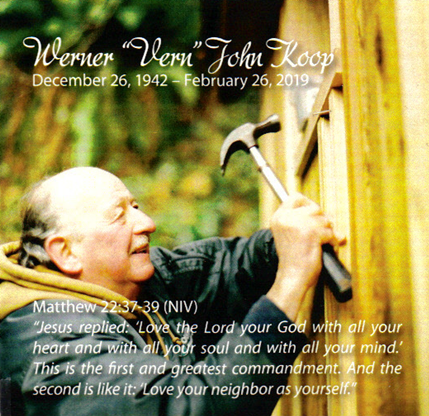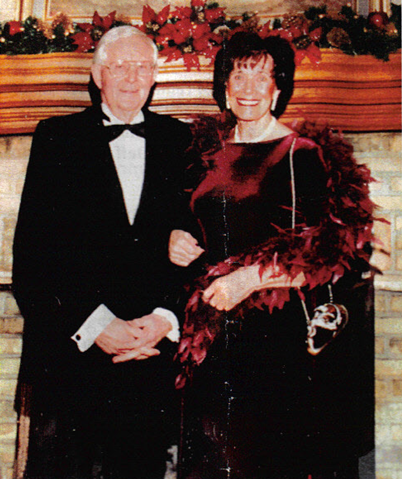Veteran evangelical leader Harold Jantz reminisces about the lives of two servants of God who recently died after long service to the Church in Canada.
Two funerals. On two occasions, just days apart in early March, I attended the funerals for two men who—you could reasonably say—had changed the world around them. They had made a difference. They were leaders. They had influenced the course of events. They were men of faith in Jesus Christ and attempted to live it out in practice. And while they shared a common faith and probably a similar calling, the expression of their lives and the final appearance on this world's stage were strikingly different.
One was Werner (Vern) Koop, a supervisor on building sites in and around Winnipeg, and the other Donovan (Don) Anderson McCarthy, a lawyer for a major insurance firm, a sportsman, political activist and longtime vice-chair of the Billy Graham Evangelistic Association of Canada.
The funeral for Vern took place in the large Eastview Community Church, a Mennonite Brethren church, and it was filled to overflowing for the weekday service. The funeral for Don took place in Winnipeg's historic Elim Chapel on a Saturday and was modestly attended. Nonetheless, both services were fine tributes to the two men.
Vern Koop
 Our family has known the Koops for decades and at one time we were part of the same congregation. When we first knew them they had little boys in tow. Their family grew to three sons and an adopted daughter of Indigenous ancestry. Early in their married life they decided to follow an invitation to join a home set up for delinquent youths in southern Ontario, Ausable Springs Ranch. It marked the kind of vocation Vern and his wife Agnes would pursue for the rest of their lives.
Our family has known the Koops for decades and at one time we were part of the same congregation. When we first knew them they had little boys in tow. Their family grew to three sons and an adopted daughter of Indigenous ancestry. Early in their married life they decided to follow an invitation to join a home set up for delinquent youths in southern Ontario, Ausable Springs Ranch. It marked the kind of vocation Vern and his wife Agnes would pursue for the rest of their lives.
In one way or another, it seemed like their orientation was always toward the marginalized and struggling. At the funeral, son Mark, who now provides leadership himself in a Vancouver ministry to troubled youth, Youth Unlimited, said that his father was proud to be connected for over five decades with Manitoba's Camp Arnes because “it cared for the underdog and provided a place for them to belong.”
In the account about his father, Mark said that Vern had a hand in virtually every building erected on the Arnes campsite over five decades. For 35 years he was a board member there. Arnes was a “perfect fit” for his dad. But that attitude was not limited to settings outside their home. The Koops began taking in foster children, and over the years they took in about 40 of them, children with special needs such as autism and Down Syndrome, and many others from “heartbreaking situations,” Mark said. A spokesman for Habitat for Humanity, Sandy Hopkins, echoed the words of the son.
During much of the same time, Vern was also employed as construction supervisor for the furniture manufacturer Palliser Furniture run by the DeFehr family. Because they were supportive to projects that helped people in need, the company donated Vern's time to “worthy causes, most significantly with Habitat for Humanity.” That involvement took Vern into many Habitat builds. The highlight for him was the 1993 President Jimmy Carter Blitz in Winnipeg which resulted in 18 houses erected in one week, for which he was the manager. Vern continued to work with Habitat for years and despite a diagnosis of cancer was still able to participate in a second Winnipeg President Jimmy Carter build in 2017. He retired from Habitat that fall but still volunteered his time with Habitat until shortly before his passing.
Vern had retired from Palliser when he reached his 60s, and then went to work full-time for Habitat. During his many years with the organization, he supervised the construction of 225 houses that became homes to families on the margins. One of Vern’s friends in the construction industry said that he would attend planning meetings without a piece of paper, yet he could have as many as thirty houses “on the go” at one time and have them finish on schedule. He hated to miss a deadline.
Vern was also involved in a program that was set up between Habitat and the Stony Mountain federal prison. It gave offenders a chance to work on Habitat builds, where they could learn skills. If they showed promise for the construction industry, they were given a three-month job with Habitat once they were paroled, a step into something more permanent. It was called the Step Program and two of the people who came through the program now work for Habitat.
Most impressive about Vern Koop was his selflessness. He did not seem to be engaged in good causes to impress people. Rather he created opportunities for others to look good. An offender who was in the Step Program and was applauded for it told a co-worker of Vern’s, “I have never been recognized for anything good, only when I did something bad and was arrested. This is the first time that someone has done that.”
A quote Vern valued and lived by, son Mark said, goes this way: “work for a cause, not applause; live life to express not impress; don't strive to make your presence noticed, just make your absence felt.” That would describe Vern Koop. And, one could add, by doing so he made faith in Jesus attractive and believable.
Don McCarthy
 Don McCarthy moved in entirely different settings. These were almost entirely out in front. His wife Marian belonged to a well-known Winnipeg family, the Hulls, who once ran the city's best-known Christian bookstore. Except for a brief time early in their married life, they always lived in Winnipeg's more affluent neighbourhoods. He went to university and graduated with a degree in law in 1950 and then joined an insurance company. He spent most of his career as v-p and general counsel for the Monarch Life Assurance company.
Don McCarthy moved in entirely different settings. These were almost entirely out in front. His wife Marian belonged to a well-known Winnipeg family, the Hulls, who once ran the city's best-known Christian bookstore. Except for a brief time early in their married life, they always lived in Winnipeg's more affluent neighbourhoods. He went to university and graduated with a degree in law in 1950 and then joined an insurance company. He spent most of his career as v-p and general counsel for the Monarch Life Assurance company.
Many people knew him as a sportsman and athlete, and he excelled. It gave him opportunities to provide leadership. He became a fundraiser for the “first of its kind” indoor arena built in his part of Winnipeg. He was a founding member of of the Winnipeg Squash Club. I’m quoting from the funeral bulletin, but it describes Don well: “He was part of the management group that raised the funds to keep the then WHA Jets in Winnipeg,” who eventually won the Avco Cup for Winnipeg, and “signed the first Swedish players in North American pro hockey.” He loved “everything about golf.”
At the same time he was actively engaged in his province's political world. In 1993, Premier Filmon appointed him chair of the Manitoba Public Insurance Corporation. Don was an “unabashed Conservative” and worked on both federal and provincial campaigns for several party leaders. It was obvious that wherever he became involved, he was present as an activist, his counsel was sought and his presence mattered.
At the same time he was a man of robust faith. Over a long lifetime, he was a member of Elim Chapel—one of Winnipeg’s historic evangelical bastions—and then Bethesda Church, which emerged from a division in the former. At the end he was back at Elim, where his funeral was conducted by John Botkin, himself once the pastor of another church birthed from Bethesda.
And it was as a man of evangelical passion that Don McCarthy became important to the Billy Graham Evangelistic Association. In the early 1950s, Billy Graham was emerging as an evangelist on the world stage. Many Canadians had come to know about Graham and were supporting his ministry—though he had not yet held a crusade in this country.
It was in 1953 that George Wilson of the Billy Graham team took the overnight train from Minneapolis to Winnipeg to meet with Don McCarthy, the young lawyer. The purpose was to use Don’s help to set up a Canadian office for the organization, and in one exhausting 12-hour day it was accomplished. An office was opened with furnishings, a first employee hired and registration completed. He came home from the day’s exertions, he related later, and went to bed. Two years later Graham held his first of 13 crusades in this country, in Toronto.
Over the years, Graham was supported strongly by Canadian associates. Right from the start, George Beverly Shea, the beloved singer, was part of the Graham team. Canadians Leighton Ford, a brother-in-law to Graham, John Wesley White and Ralph Bell, were also key parts of his team. Over the years, these and other BGEA associates have preached in over 200 missions in Canada. In Saskatoon in 1983, Franklin Graham preached for the first time for the BGEA team.
For over half a century, McCarthy remained a key member of the board of Billy Graham Evangelistic Association in Canada, for a decade as secretary (1968-78) and for a dozen years as vice-chair (1980-92) and finally as director-emeritus until 2013. The current director of operations and human resources for the BGEA in Canada, Peter von Kampen, said at the funeral that Don was a gentleman who gave practical expression to his faith by putting his skills and experience to use in the support of a project that ended up blessing countless others.
Two funerals. Two men, each quite different from the other, yet both placing their talents into causes that were much greater than themselves. That's how Christ's kingdom is blessed and built.
Harold Jantz of Winnipeg is a retired editor known for his work at ChristianWeek and Mennonite Brethren Herald. Photos above come from bulletins circulated at the funerals.
Author:
Harold Jantz